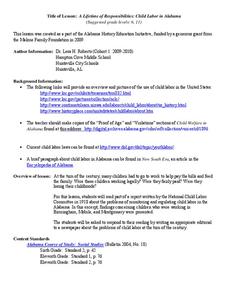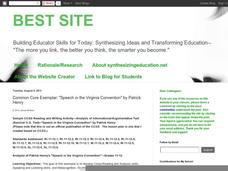National Endowment for the Humanities
Revolution '67, Lesson 1: Protest: Why and How
To some people, protesting is as American as apple pie, but the factors that lead to protests can be as confusing to veteran activists as to today's youth. Revolution '67 explores the riots in Newark, New Jersey as a case study. Using...
Hawaiʻi State Department of Education
Reporting on History
Have fun with history and turn your kids into news reporters of the past. Each group will research, script, and deliver a news report on a historic event they are studying in class. They'll identify the main characters of the historical...
Alabama Department of Archives and History
"Scottsboro Boys": A Trial Which Defined an Age
Here's a must-have resource. Whether your focus is racism, the Great Depression, the "Scottsboro Boys" trial, or part of a reading of To Kill A Mockingbird, the information contained in the seven-page packet will save hours of research...
Advocates for Human Rights
Nativism and Myths about Immigrants
Where do anti-immigrants myths come from, and how can they be refuted? Learners critically analyze media reports and how to identify reliable sources. After studying a timeline that details the history of US nativism, groups research the...
Alabama Department of Archives and History
A Lifetime of Responsibilities: Child Labor in Alabama
Imagine children working long hours in factories, coal mines, and in the fields. Class members examine a series of pictures and read about early attempts to regulate child labor and current child labor laws.
Curated OER
You and the Military
Do military recruiters plan to visit your campus? If so, the visit presents an opportunity for class members to engage in a series of action projects. Class members interview recruiters, propose a PTA meeting to discuss the pros and cons...
Advocates for Human Rights
Who are Immigrants?
What do Jerry Yang, Patrick Ewing, John Muir, Charlize Theron, Peter Jennings, and Saint Frances X Cabrini all have in common? They are all immigrants to the United States. Famous and not-so-famous immigrants are the focus of a resource...
Stanford University
Letter from Birmingham Jail: The Power of Nonviolent Direct Action
What strategies are most effective in changing an unjust law? Class members examine the tactics used in the Birmingham Campaign of 1963 (Project C) to achieve social justice and social transformation. After examining documents that...
Stanford University
Lesson Plan: Montgomery Bus Boycott
Most of us have heard of Rosa Parks, the Montgomery Bus Boycott, and Martin Luther King, Jr. But what about Claudette Colvin, Virginia Durr, Freedom Summer, or the Birmingham Children's Crusade? A five-lesson unit prompts class members...
Civil War Trust
Genealogy
The Civil War is undoubtedly a part of America's history, but could it be part of your pupils' history as well? Middle schoolers conduct research to discover a connection between their ancestors and the American Civil War. Whether they...
Curated OER
Speech in the Virginia Convention
“. . .different men often see the same subject in different lights. . .” but the great orator Patrick Henry used all the skills at his command to craft a speech to convince listeners to see things as he did--that liberty was worth dying...
9/11 Memorial & Museum
The Destruction and Rebuilding of the World Trade Center
How did an investigation into the causes of the collapse of the Twin Towers, as a result of the 9/11 attacks, inform the construction of the new 1 World Trade Center? That is the central question of a resource that asks class members...
School Improvement in Maryland
Monetary Policy
As an introduction to monetary policy, groups investigate and evaluate the effectiveness of current monetary and fiscal policies on promoting full employment, price stability, and economic performance. They then apply monetary tools to...
National Endowment for the Humanities
Revolution '67, Lesson 2: What Happened in July 1967? How Do We Know?
Even in a world in which dozens of participants and curious onlookers record every controversial event, the basic facts of what happened are often in dispute. Revolution '67, Lesson 2 explores 1967 Newark, New Jersey using an examination...
National Endowment for the Humanities
Kate Chopin's The Awakening: Local Color in the Late 19th Century
Kate Chopin's The Awakening introduces readers not only to the lush Louisiana setting of Grand isle but also to the nuances of Creole culture. the second lesson plan in a three-part series examines how Chopin's use of literary realism...
Curated OER
1960 America: Foreign Policy
The 1960's marked shifts in American culture, politics, and policy. Your class groups up to research a series of primary source documents resulting in a timeline and a 15 minute oral presentation. Active learning all the way.
The New York Times
Teaching the Vietnam War with Primary Sources from the New York Times
Use the New York Times database of primary sources to teach a unit on the Vietnam War. The resource consists of a variety of primary sources as well as a lesson plan showcasing how to teach a lesson using them. Pupils analyze the sources...
Historical Thinking Matters
Rosa Parks: 1 Day Lesson
You've heard of the historical moment when Rosa Parks refused to give up her seat on a bus, but did you know that some historical accounts disagree on where she sat? Investigate this query with your young historians, and practice...
Classroom Law Project
How do we hire a President?
What are the job requirements for the office of president of the United States? What attributes should a candidate possess? Are the qualities needed to govern the same as those needed to win? What can an analysis of the management style...




















